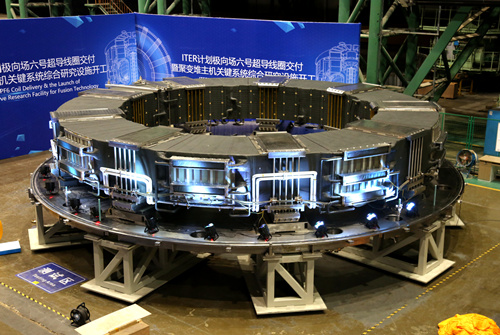The number 6 poloidal field superconducting coil (or PF6 coil) which is the first large superconducting magnet coil of ITER (short for International Thermonuclear Fusion Experimental Reactor) project has been completed and will be shipped to ITER site in France as the celebration of its delivery was held on 20 September in Hefei, Anhui, China.
PF6, the key component of ITER, will be installed at the bottom of the ITER cryostat. It consists of nine twin-shaped wilding pancakes and a series of supporting accessories, weighing up to 400 tons, even heavier than two Boeing 747 airplanes.
In order to meet the strict requirements for the magnetic field configuration of the ITER device, the profile accuracy of the PF6 coil within ±1.5mm after winding must be strictly controlled. For a superconducting coil with an external diameter of about 11.2 meters and to be wound in a “two-in-hand” configuration, the challenge is incredibly unprecedented. The NbTi superconductor used for winding the coil stretches up to 13.5 kilometers.
Due to its technical complexity, it took six years of the manufacturing team with Institute of Plasma Physics, Hefei Institutes of Physical Science to complete the task.
Facing the huge challenges, the whole team was highly motivated which enabled them to overcome difficulties in “two-in-hand” coil winding by unbelievable less than one year. And particularly worth being highlighted, all the winding equipment was 100% made in China.
In December 2016, the team was pleased to see all the full-size joint sample for the PF6 coil joint qualification had passed the test by ITER organization with fantastic performance, winning it the full praise from Mr Sborchia Carlo, project supervisor for ITER and Fusion for Energy (or F4E) by pointing it as “the best sample both in manufacturing accuracy and appearance” he had ever seen. In fact, It was the ever first joint one in ITER PF coil projects that met ITER’s highly strict technical requirements.
To the June this year, the impregnated winding pack that is 1.6 meters in cross section and 1.2 meters in height had been completed from 9 double pancakes with a total of 468 conductor turns, leading the PF6 coil to a perfect ending of vacuum insulation impregnation manufacturing. The specialization of insulation in both design and manufacturing enables the PF6 coil to work for ITER in ultra-low temperatures of minus 269 degrees Celsius and strong radiation of 10 kgy Gamma, as well as to possess tensile strength close to that of stainless steel.
Since ITER is the most ambitious international scientific project, its component PF6 project also sets a good example of collaboration between China and Europe for building a new mode of international fusion collaboration.

the PF6 coil (Image by WANG Tianhao)
Contact:
ZHOU Shu
Hefei Institutes of Physical Science (http://english.hf.cas.cn/)
Email: zhous@hfcas.ac.cn
 Tel: +86-551-65591206
Tel: +86-551-65591206
 Fax: +86-551-65591270
Fax: +86-551-65591270
 Emai: zhous@hfcas.ac.cn
Emai: zhous@hfcas.ac.cn
 350 Shushanhu Road
350 Shushanhu Road